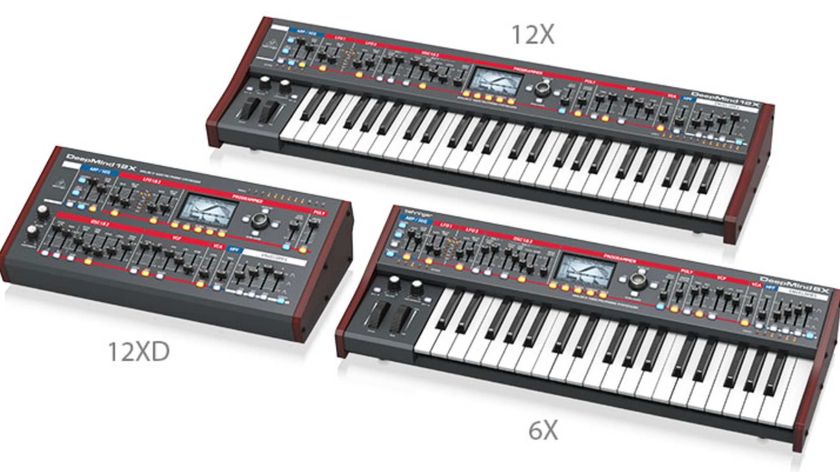From sweatbox clubs to sold-out arenas: John Fred Young on the rise and rise of Black Stone Cherry
Southern gent looks back on his journey to arena headliner

'This is a fairytale...'
“This is a fairytale,” John Fred Young says backstage at Nottingham's cavernous Motorpoint Arena ahead of his band's bill-topping performance. “I don't take it for granted because I don't want it to stop. I don't want to wake up and go, 'Well that was cool.' I want to keep going and going.”
Going and going is what has helped propel John Fred and co from four kids jamming out rock tunes in deepest Kentucky to bonafide arena headliners. They have reached these dizzying heights in part thanks to their superb fifth record, the recently-released Kentucky. It's a record that sees Black Stone Cherry at their supercharged best, as John Fred anchors rip-roaring rockers like 'Soul Machine' and 'The Way of the Future'.
“It's just us getting back to writing songs for our fans and ourselves," John Fred explains. "We were with our old label for ten years and left in January 2014 so we were free. We could be creative and not worry about pushing singles for radio. In America you're only as good as your last single.
“On this record we weren't restrained and we got to write whatever we wanted to write. It was fun but also scary. It was weird not having someone on your shoulder saying, 'Maybe you should make that song a little shorter, maybe you should write about this…' We were always poked at like something in a cage. Now we write for our fans and we know what they want.”
John Fred admits that the band is refreshed and recharged after escaping their old record deal and moving over to rock label Mascot. It's startling to hear of the struggles the band faced while they put out three records in a row which hit the top 30 both in the UK and the US.
“We were squeezed to death with our first record deal, one of those 360 deals,” the larger than life drummer continues. “We were struggling just to keep the lights on and food on the table back home.
"Those 360 deals are no good for bands, if you're in a band do not sign those. That's the record label trying to make up for the drop in record sales. They're not selling records like they used to so they've started taking everything from bands, like a percentage from merch, from live shows. I remember meeting with the head of our old label who said they couldn't put any more money into us unless we signed this deal and we said that the deal sucked. We were in a financial hurricane."
Black Stone Cherry headline Ramblin' Man Fair onSunday 24th July –www.ramblinmanfair.com
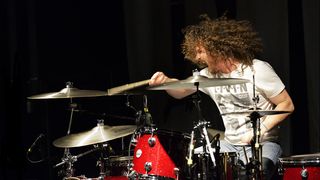
'Maybe we didn't suck as bad as we thought!'
Signing with Mascot and putting out record five continues what has been one hell of a journey for the Kentucky foursome. This writer first saw Black Stone Cherry nine years ago when they were an explosively raw talent opening up for Aerosmith at a rain-drenched Hyde Park.
We were blown away by the performance, particularly that of the livewire drummer who hit as hard as we'd ever seen with arms flailing all over the place. When we put this to John Fred almost a decade on he recalls that the band wasn't quite so convinced by the show.
“We were on the second stage and Chris [Robertson, vocals] was ill and lost his voice,” he says. “We thought we bombed and the reviews came out and we had great reviews so we thought, 'Maybe we didn't suck as bad as we thought!'”
Opening up for Aerosmith was certainly a far cry from the band's first trip over this way just a few months earlier.
“We came over in a passenger bus supporting another American band. We arrived and the promoters didn't know we were on the bill. We were playing to 80 people in a room smaller than the dressing room we're in today. I remember playing and seeing people's faces, they were like, 'Oh my god, what is this?'”
Buoyed by the frenetic reception received from UK crowds, the band were soon back in Blighty, returning for another tour before 2007 was over.
“Later in that year we did a headline tour in 350-capacity venues. From then on we did so many tours, headline tours, opening for Alter Bridge, Def Leppard and Whitesnake, Nickelback. When we played with Def Leppard Rick Allen came down and sat at my kit and said he loved the tuning. I had no idea what I had done with the tuning but that was cool! We're just so pleased to be able to keep doing this, next year will be ten years since we first came over here.”
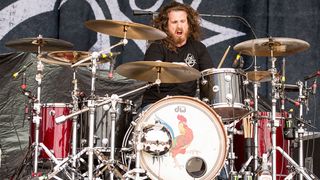
'When it's go time, the beast comes out.'
Fast forward back to today and as we watch John Fred as near as dammit lay waste to his kit during a two song soundcheck we see that he has lost none of that spark that first grabbed our attention in Hyde Park.
It's an infectious energy that we have since seen time and again through tiny clubs right up to huge arenas. John Fred is adamant that whether he's playing a 200-capacity rock sweatbox or a 10,000-seat arena, his performance remains the same.
“Recently we did a charity show at a 250-seat club in London, it was a sweaty, nasty rock club and we had a great time. When it's go time, the beast comes out. I don't know where the energy comes from.
“At the start in our little practice house I wanted to be the most energetic, powerful drummer in the world and I still strive for that. Early on I was a little more theatrical and I don't do that as much now because I'm focused more on what I call badassery.”
But don't be fooled into thinking John Fred is brawn over brains, there's plenty of technique mixed in with his primal tom smashing.
“I want to incorporate rudiments into my playing as well. I haven't studied drumming but I do class myself as a technical drummer in everything being clean and working on my chops, I've always wanted to be a chops guy. I learned rudiments early on and practiced rudiments more than anything. I love playing against the natural flow of the song, I can do that because I'm in a great band and we have a great tempo.”
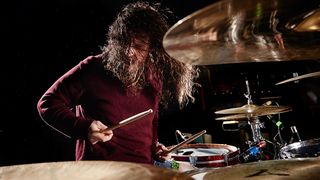
'... I should have practiced more.'
Anyone watching Black Stone Cherry live will have undoubtedly been wowed by John Fred's drum solo. It's a section that provides a short sharp burst of tom battering as the drummer disappears amid a blur of hair and sticks flying through the air.
“I try to keep the solo short and powerful. In an arena if you start doing dynamics and jazzy stuff you will lose people. I hate that but that's how it is.
"I always try to do something different, something people haven't seen. I saw a solo where Gene Krupa was standing up and playing the bass strings with his sticks. I thought that was cool and I started doing that in 2006 and then I started seeing everybody doing that. That was cool.
"We play to a lot of young kids so I like to bring some of the older stuff back. We get people coming up to us saying that they've loved us since 'Rain Wizard' came out when they were 12 and I think, 'Man, how old are we getting?!' I tell kids to go back and listen to the music we listened to and then go back and listen to the bands that those guys listened to.”
Anyone watching John Fred's solo will be hard pushed to not wince their way through it in sympathy for his kit. Those DW shells and Zildjian cymbals are given one hell of a punishing. It's a kit that has undergone a gentle tweak in the last year or so, with a second bass drum coming and then going.
“I put a double bass to my kit last year,” John Fred explains. “We started the tour and it was horrible. I practiced at home, but I should have practiced more. It took me ten shows before I was comfortable. I've always played single pedal. What I've managed to do with my single pedal over the years I felt like I lost a little bit of that by switching to double bass.
"It looked great with two 24” bass drums, though. That wasn't like a Terry Bozzio kit but it was big for me. I've gone back to focusing on the single stroke rolls between my hand and foot now. I injured my hand years ago while I was in school and I was playing marching band. I had my hand bandaged up so I had to do everything with my left hand. That got my left hand almost to where my right hand was and that has helped me over the years to be able to play open handed.”

Some wise final words
As our time with John Fred draws to a close he reflects on the epic journey that his band has taken him on during the last nine years. He's obviously thrilled with the trajectory that Black Stone Cherry's career has taken, an undoubted upward curve but one that his been built slowly and steadily on the back of hard graft, and that's just the way they like it.
“If a band has a big hit and goes straight to playing arenas you're missing out on the bar experience with the crap load out and the floor that you stick to when you walk on it because it's covered in beer, that's rock 'n' roll. We still get that in the States. It's much bigger now compared to a couple of years ago but in America we're still playing 700-800-seat clubs. That's humbling and it keeps you in check.”
We end by asking John Fred how young musicians can follow in his footsteps and take a band up to arena headlining level. His answer his typically John Fred.
“You've got to take care of yourself if you want to do this for a living. You've got to eat right, sleep right...and stay away from the devil's party liquor!”
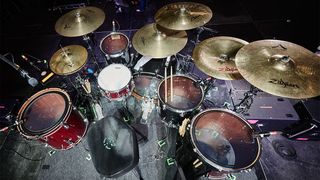
John Fred's Kit
DW maple mahogany kit
24”x18” bass drum
13”x11” rack tom
16”x14” floor tom
18”x16” floor tom
20”x18” bass drum used as a floor tom
14"x 7" Edge snare
14"x-8" Nickel over brass
Zildjian Cymbals
15” K Custom Dark hats
20” K Custom Dark crash
20” Oriental Trash
21” Sweet ride for crash
21” A crash
23” A medium ride
PLUS
DW 9000 hardware
Vater Warrior sticks
Evans heads
Porter and Davis BC2

Rich is a teacher, one time Rhythm staff writer and experienced freelance journalist who has interviewed countless revered musicians, engineers, producers and stars for the our world-leading music making portfolio, including such titles as Rhythm, Total Guitar, Guitarist, Guitar World, and MusicRadar. His victims include such luminaries as Ice T, Mark Guilani and Jamie Oliver (the drumming one).
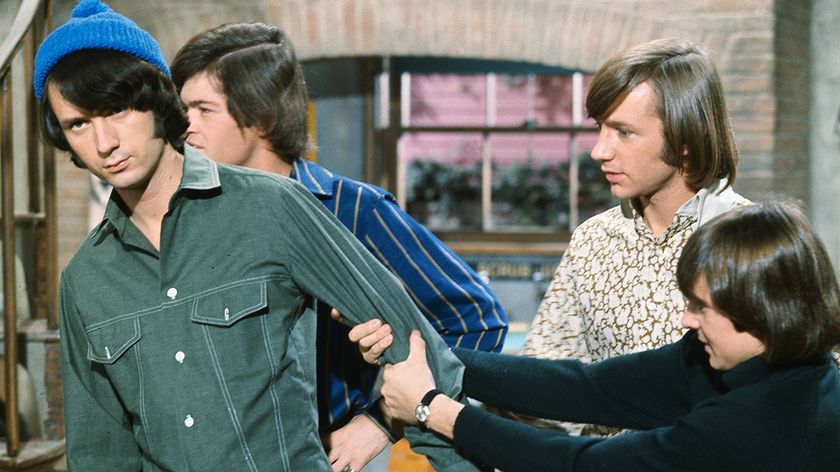
"They said, ‘Thank you, but no thank you - it’s not a Monkees song.’ He said, ‘Wait a minute, I am one of the Monkees! What are you talking about?’": Micky Dolenz explains Mike Nesmith's "frustration" at being in The Monkees
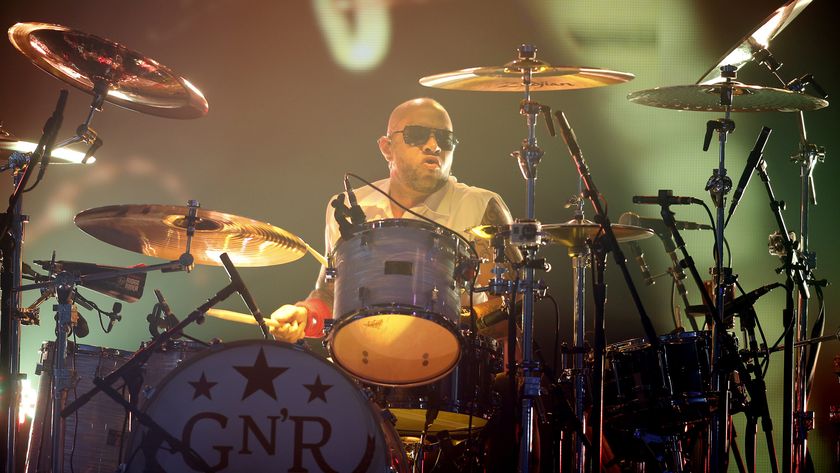
“There’s nights where I think, ‘If we don’t get to Paradise City soon I’m going to pass out!’”: How drummer Frank Ferrer powered Guns N’ Roses for 19 years

"They said, ‘Thank you, but no thank you - it’s not a Monkees song.’ He said, ‘Wait a minute, I am one of the Monkees! What are you talking about?’": Micky Dolenz explains Mike Nesmith's "frustration" at being in The Monkees

“There’s nights where I think, ‘If we don’t get to Paradise City soon I’m going to pass out!’”: How drummer Frank Ferrer powered Guns N’ Roses for 19 years
